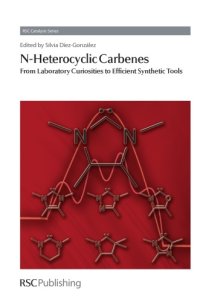
Ebook: N-Heterocyclic Carbenes : From Laboratory Curiosities to Efficient Synthetic Tools
Author: Silvia Díez-González, James J Spivey, Guy Bertrand
- Series: RSC catalysis series
- Year: 2010
- Publisher: Royal Society of Chemistry
- City: Cambridge
- Language: English
- pdf
Over the last fifteen years, N-heterocyclic carbenes (NHCs) have mostly been used as ancillary ligands for the preparation of transition metal-based catalysts. Compared to phosphorus-containing ligands, NHCs tend to bind more strongly to metal centres, avoiding the necessity for the use of excess ligand in catalytic reactions. The corresponding complexes are often less sensitive to air and moisture, and have proven remarkably resistant to oxidation. Recent developments in catalysis applications have been facilitated by the availability of carbenes stable enough to be bottled, particularly for Read more... Abstract: Over the last fifteen years, N-heterocyclic carbenes (NHCs) have mostly been used as ancillary ligands for the preparation of transition metal-based catalysts. Compared to phosphorus-containing ligands, NHCs tend to bind more strongly to metal centres, avoiding the necessity for the use of excess ligand in catalytic reactions. The corresponding complexes are often less sensitive to air and moisture, and have proven remarkably resistant to oxidation. Recent developments in catalysis applications have been facilitated by the availability of carbenes stable enough to be bottled, particularly for
Over the last fifteen years, N-heterocyclic carbenes (NHCs) have mostly been used as ancillary ligands for the preparation of transition metal-based catalysts. Compared to phosphorus-containing ligands, NHCs tend to bind more strongly to metal centres, avoiding the necessity for the use of excess ligand in catalytic reactions. The corresponding complexes are often less sensitive to air and moisture, and have proven remarkably resistant to oxidation. Recent developments in catalysis applications have been facilitated by the availability of carbenes stable enough to be bottled, particularly for Read more... Abstract: Over the last fifteen years, N-heterocyclic carbenes (NHCs) have mostly been used as ancillary ligands for the preparation of transition metal-based catalysts. Compared to phosphorus-containing ligands, NHCs tend to bind more strongly to metal centres, avoiding the necessity for the use of excess ligand in catalytic reactions. The corresponding complexes are often less sensitive to air and moisture, and have proven remarkably resistant to oxidation. Recent developments in catalysis applications have been facilitated by the availability of carbenes stable enough to be bottled, particularly for
Over the last fifteen years, N-heterocyclic carbenes (NHCs) have mostly been used as ancillary ligands for the preparation of transition metal-based catalysts. Compared to phosphorus-containing ligands, NHCs tend to bind more strongly to metal centres, avoiding the necessity for the use of excess ligand in catalytic reactions. The corresponding complexes are often less sensitive to air and moisture, and have proven remarkably resistant to oxidation. Recent developments in catalysis applications have been facilitated by the availability of carbenes stable enough to be bottled, particularly for Read more... Abstract: Over the last fifteen years, N-heterocyclic carbenes (NHCs) have mostly been used as ancillary ligands for the preparation of transition metal-based catalysts. Compared to phosphorus-containing ligands, NHCs tend to bind more strongly to metal centres, avoiding the necessity for the use of excess ligand in catalytic reactions. The corresponding complexes are often less sensitive to air and moisture, and have proven remarkably resistant to oxidation. Recent developments in catalysis applications have been facilitated by the availability of carbenes stable enough to be bottled, particularly for
Download the book N-Heterocyclic Carbenes : From Laboratory Curiosities to Efficient Synthetic Tools for free or read online
Continue reading on any device:

Last viewed books
Related books
{related-news}
Comments (0)